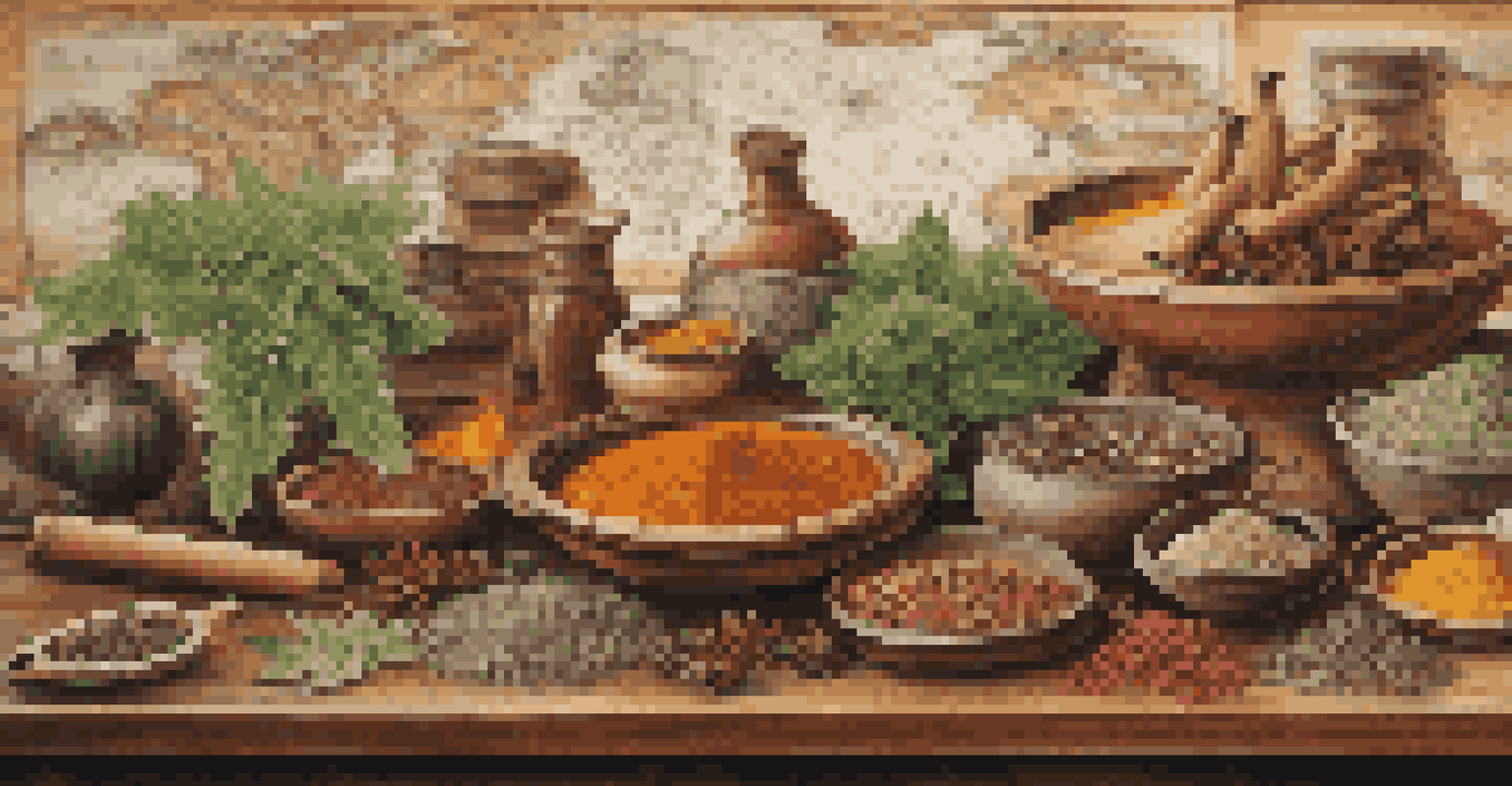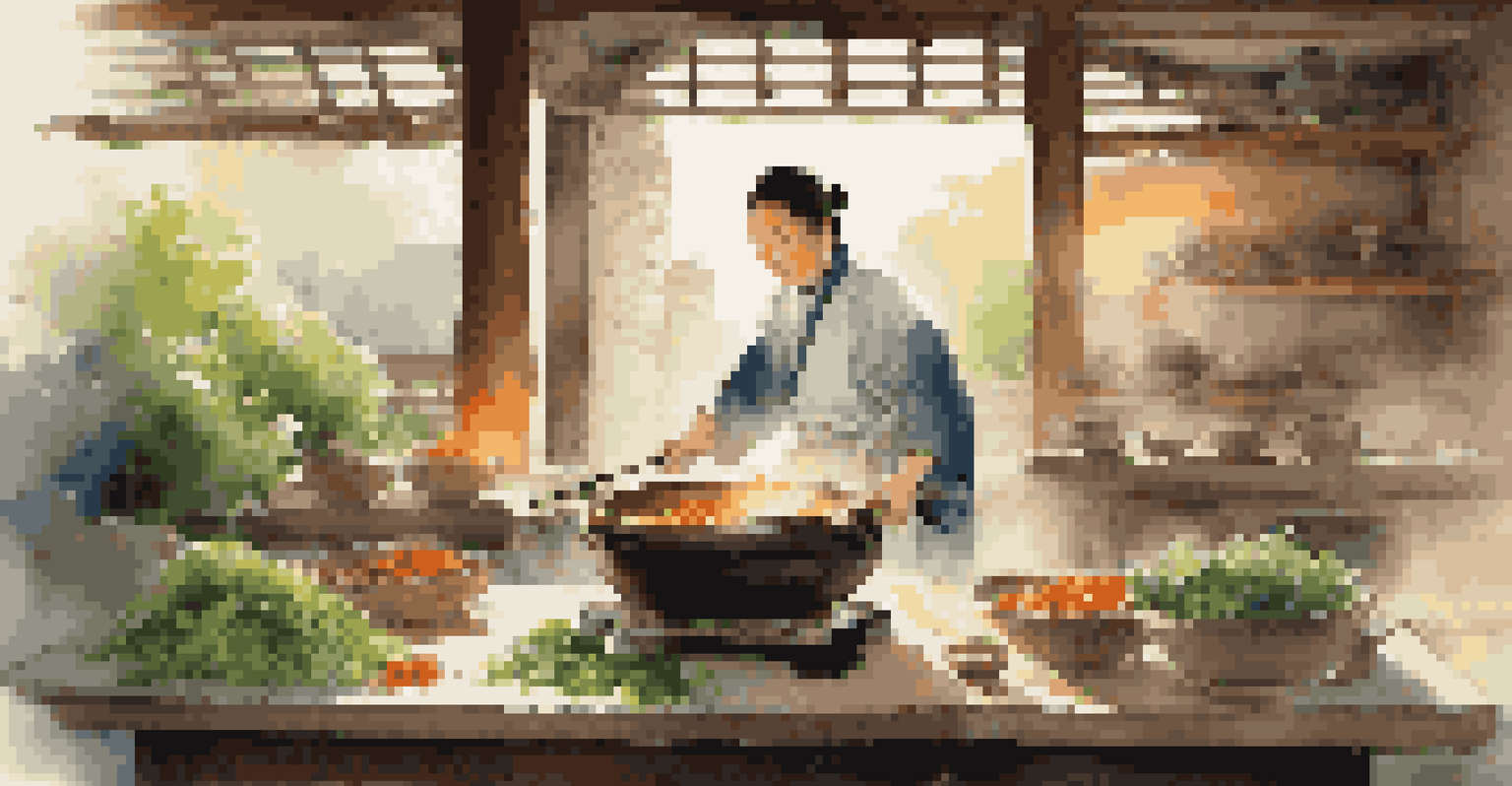The Role of Cooking in Ancient Civilizations: A Cultural Insight

Cooking as a Catalyst for Community Development
In ancient civilizations, cooking was more than just a means of survival; it was a cornerstone of community development. Gathering around a fire to prepare food brought people together, fostering social bonds and cooperation. This communal activity often led to the sharing of stories and traditions, which were vital for cultural continuity.
Food is our common ground, a universal experience.
As communities grew, so did the complexity of their cooking practices. Different regions developed unique cuisines based on available resources, showcasing local ingredients and cooking methods. This not only enriched their diets but also solidified a sense of identity among the people.
For example, in ancient Mesopotamia, communal feasting was a significant event, often tied to religious and agricultural celebrations. These gatherings not only nourished the body but also nourished the spirit, reinforcing social hierarchies and communal ties.
Food as a Symbol of Cultural Identity
In many ancient societies, the types of food prepared and consumed served as a reflection of cultural identity. Specific dishes often had deep meanings, symbolizing beliefs, values, and history. For instance, the use of spices in Indian cuisine not only enhanced flavor but also indicated trade routes and cultural exchanges.

Similarly, the Greeks used food in their religious practices, offering specific dishes to their gods during rituals. This intertwining of food and spirituality highlighted how cooking shaped social norms and community values.
Cooking Fosters Community Bonds
Gathering to prepare and share food has historically strengthened social ties and cultural continuity within communities.
Food also played a role in the migration of peoples, as culinary traditions traveled with them, blending with local customs. This created a rich tapestry of flavors, demonstrating how cooking can reflect a culture's journey through time.
Technological Innovations in Cooking
The evolution of cooking techniques significantly influenced ancient civilizations. From the invention of pottery to the use of fire, these innovations allowed for a wider variety of foods to be prepared and stored. Cooking methods such as boiling, baking, and roasting not only improved food safety but also enhanced flavors.
Cooking is like love. It should be entered into with abandon or not at all.
For example, the discovery of how to harness fire revolutionized cooking, transforming raw ingredients into palatable meals. This shift not only broadened diets but also improved nutrition, which was essential for the growth of early societies.
In ancient China, the development of woks and steamers led to unique cooking styles that are still celebrated today. These technological advancements not only shaped culinary practices but also influenced communal dining experiences.
Culinary Practices and Social Hierarchies
Cooking in ancient civilizations often reflected social hierarchies and class distinctions. The wealthier classes could afford diverse ingredients and elaborate cooking methods, while the lower classes relied on simpler, more accessible foods. This disparity influenced not only diet but also the status of individuals within society.
For example, in ancient Egypt, the pharaohs had access to luxurious foods like honey and figs, while the laborers primarily consumed bread and beer. This division highlighted the importance of food as a status symbol, reinforcing social structures.
Food Reflects Cultural Identity
The dishes prepared in ancient societies symbolized their beliefs and values, serving as a reflection of their cultural identity.
Moreover, the preparation and presentation of food became a way for elites to showcase their wealth and power. Lavish feasts were not just about sustenance; they were extravagant displays that served to impress guests and assert dominance.
Religious Significance of Cooking
Cooking held profound religious significance in many ancient cultures, often intertwined with spiritual practices and rituals. Food was seen as a way to communicate with the divine, with certain dishes being prepared for offerings and sacrifices. This connection between food and spirituality reinforced the importance of cooking in daily life.
In ancient Greece, for instance, it was customary to offer the first fruits of a harvest to the gods, symbolizing gratitude and respect. These acts not only fulfilled religious obligations but also strengthened community bonds through shared beliefs.
Similarly, the Jewish tradition of kosher cooking reflects a deep connection between food practices and religious law. The care taken in food preparation serves as a reminder of spiritual discipline and cultural heritage.
Trade, Travel, and Culinary Exchange
Trade routes played a crucial role in the evolution of cooking in ancient civilizations, facilitating the exchange of ingredients, spices, and culinary techniques. As merchants traveled, they brought back exotic foods and cooking methods that influenced local cuisines, creating a dynamic culinary landscape.
For example, the Silk Road was instrumental in introducing spices like cinnamon and pepper to Europe from Asia, which transformed European cooking. These new flavors not only enhanced dishes but also sparked a culinary renaissance.
Trade Enriches Culinary Diversity
Trade routes facilitated the exchange of ingredients and cooking techniques, leading to a rich tapestry of culinary practices across civilizations.
Furthermore, travel and conquest often led to the fusion of diverse culinary traditions. The blending of flavors and cooking styles from different cultures created unique dishes that celebrated the richness of human interaction.
The Legacy of Ancient Cooking Practices Today
The culinary practices of ancient civilizations have left a lasting legacy that continues to influence modern cooking. Many of the techniques and ingredients used today can be traced back to these early societies, showcasing the continuity of culinary traditions.
For instance, the Mediterranean diet, rich in fruits, vegetables, and grains, has roots in ancient Greek and Roman cuisines. The emphasis on fresh, healthy ingredients has made it a popular choice in contemporary diets.

Moreover, the cultural significance of food remains relevant today, as communities gather to share meals, celebrate traditions, and pass down recipes. This enduring connection emphasizes that cooking is not just about sustenance; it's a vital expression of culture and identity.